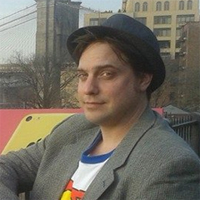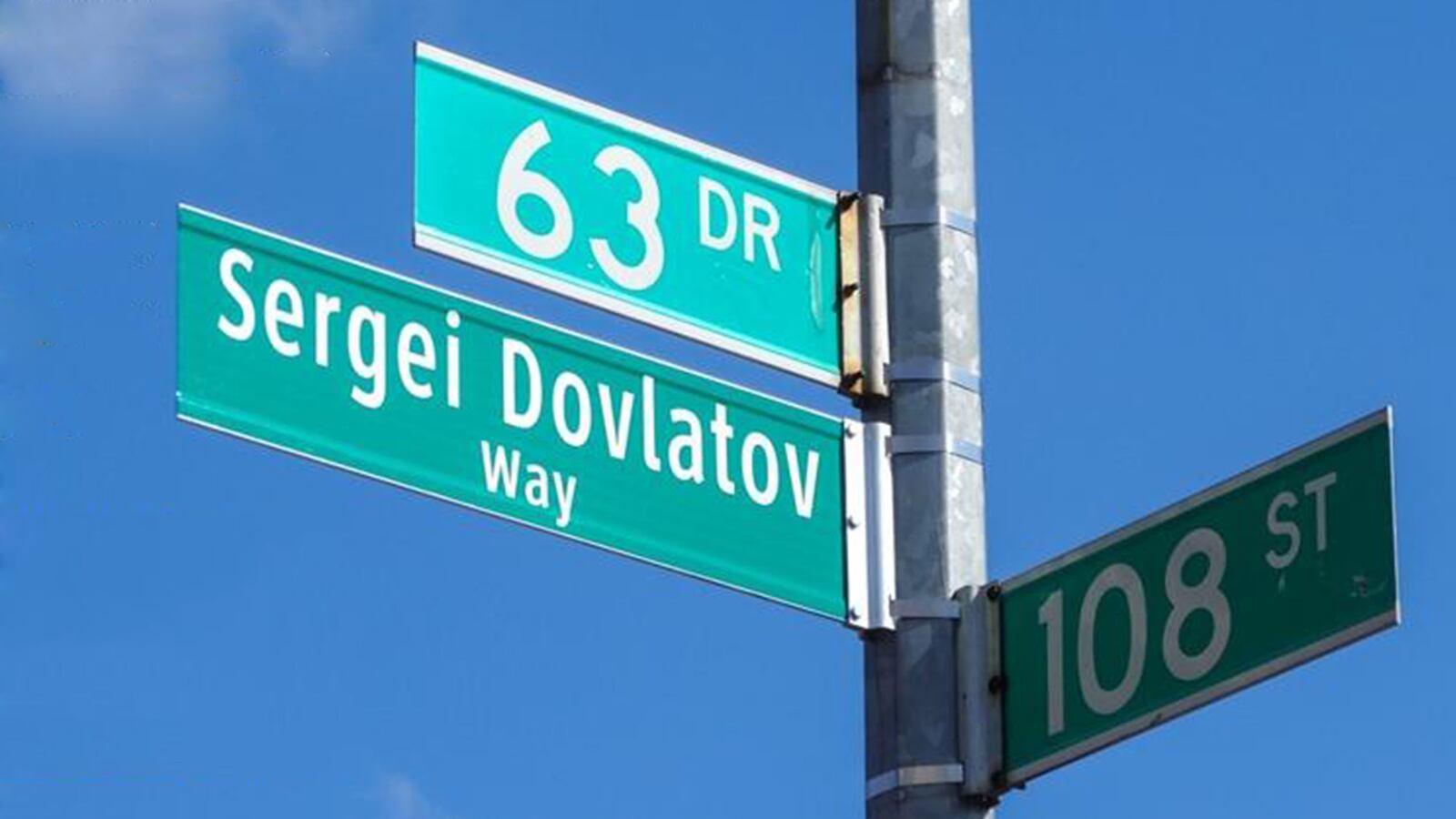The writer Sergei Dovlatov had a street renamed in his honor recently. Last Sunday morning, a clump of eager and aging onetime immigrants from the Soviet Union of Brezhnev stood around an un-picturesque corner in Queens as New York City Councilwoman Karen Koslowitz, along with the honored man’s widow and children, pulled a string and unsheathed a sign renaming the intersection “Sergei Dovlatov Way.”
Of the the four television crews filming the occasion, all were Russian. Three were based in Moscow and the other was a Brooklyn operation only broadcast on the internet. Channel One, Putin’s official newscasting arm, was there interviewing friends and family of Sergei Dovlatov.
The Soviet Union had not been kind to the author, who died in 1990 after 12 years in New York. He’d had several books translated into English and other Western tongues, and a few stories in the New Yorker. Nevertheless, to Russian readers he is a Salinger or a Vonnegut, although in appearance and character he was our very own Hemingway. After being dead for 24 years, this staunch opponent of totalitarian government is safe for Putin’s minions to cover.
Of course, inside Russia, the same kind of people (or often, just the same people) who now run the place persecuted and hounded Dovlatov and pushed him right out of the country and onto this corner of Queens back in the ’70s. Channel One of Moscow was at liberty to celebrate the occasion, despite Putin, the latest of Russia’s autocrats, calling into question press freedoms and the right to assemble, along with the borders of sovereign states. The longitude between Queens and the Kremlin gave Channel One some latitude.
Dovlatov was a merciless opponent of oppression, whose chief weapon was one dictatorships are rarely good at facing: humor. That made his appearance on Putin’s television-division ironic. At home they would have banned him. Or worse; the girls of Pussy Riot have just finished their two-year prison sentences and Mikhail Khodorkovsky his decade. Had Dovlatov lived, the current conditions in Russian would have been nothing if not familiar.
The Soviet regime was merciless to its opponents, and millions suffered and perished in its labor camp. In his youth, Dovlatov was conscripted to guard one, satisfying the requirement for military service. Writing about the experience, humorously, left him a favorite amongst both prisoners and their guards, an odd situation. Then again, that basically described the Soviet population, with one half guarding the other, making Dovlatov universally adored, as he is to this day.
Josef Brodsky, the other literary giant of that era, often called the Third Wave, was the one to win the Nobel Prize, but it is Dovlatov whom the people enshrined. When it took signatures to get the city council to rename the corner, 19,000 piled up so quickly that the authorities had to ask the organizer, Alex Rubin, to stop submitting them.
The event on Sunday started outside and early, and ended late and drunken, feet away from the table where the author once sat and wrote, where the desk calendar has not been changed since the day of his death on Aug. 24, 1990. After the representatives of the New York City government took their leave and the nefarious Muscovite Channel One went to their studio to edit the interviews into something innocuous, removing any hint of criticism and instead celebrating the author’s gastronomic enthusiasm (he was a giant of a man), the party moved to Keuka, a wine bar where the hosts, fellow admirers of the author, put on a fine spread.
The crowd eventually winnowed to insiders, and things ended in the same apartment in which the author’s widow and daughter still live, although now it’s on “Dovlatov’s Way.” Ukraine was discussed as infrequently as possible, since everyone was holding back to keep the peace, but even here, far from Donbass and Crimea, the community has its divisions. Supporters of the Putin regime were pointed out in a whisper. It was well known that a famed photographer, who shot the entire Third Wave including Brodsky and Baryshnikov, has now become a grey eminence and a staunch Putinist. Meanwhile, the younger of the street revelers tried to score digs at Moscow’s militarism, especially for Channel One. All of it was edited out in the later broadcasts; I checked.
As the sun set and the vodka flowed, tongues loosened and the factions, often men and women who shared childhoods with the end of Stalin’s gulag regime, found ways to claim the author for their side. The smaller pro-government party argued that he approved of law and order and would hardly have supported the “vulgar and thoughtless expression” of Pussy Riot. His own prose, they said, was so meticulously crafted that within one sentence, Dovlatov never used two words starting with the same letter.
But the refutations were damning. Wasn’t it the KGB that destroyed the set plates of his book just before publication? Dovlatov hated Soviet oppression and battled repression subtly, by not condescending to notice it, and keeping things light. No one fought, and with the departure of Putin’s propaganda team, tensions subsided. Dovlatov himself would have written up the intergenerational conflict with great pleasure; while the 80 year old guests argued for Putin’s law and order, the younger set (around 60) appreciated a free Ukraine. Ironic that the eldest appreciated Russian militarism the most, proud of a resurgent and powerful motherland, despite a youth steeped in Stalinism.
Dovlatov appreciated irony constantly, consistently, and with élan. The fact that there was a street named for himself and a Putinesque station filming it would have amused him to no end, a geographical and ideological triumph of sorts. In fact, it is a victory for the entire world of Russian America, especially the quickly disappearing Third Wave. But despite the spin that Moscow would put on this far-away event, the man himself would never have supported Putin’s warmongering and freedom trampling. He would have found it just as banal as he did that of Vladimir Putin’s one-time superiors at the Lubyanka, who are now pleasantly retired in warm places with relaxed tax laws. Extradition they don’t worry about, since one of their own is in charge.
Unlike Germany, Russia never had a Nuremberg. When asked whether there was any possibility of the author joining the ranks of the “Crimea is ours” crowd, those closest to him said certainly not. After all, even within the Soviet Union, Dovlatov was happiest in Estonia, which was about as far west in all senses as one could reach back then.
Laws against homosexuality, prohibitions on American adoption of Russian orphans, the incarceration of political prisoners just like in the old days, whether they are chess masters or punk singers or billionaires with political intentions, incursions into foreign countries, war on the Ukrainian border by soldiers without insignia… Perhaps the funniest thing Dovlatov would have noticed, and he was a funny man, was that le plus ça change, plus c'est la même chose…. Hackneyed chestnuts like that are reserved for old toastmasters, and yet, there we were. At the after-party in the restaurant, after the truly bad TV channel left, the only mildly bad ones gossiped that Channel One sure wouldn’t be covering this inside the motherland.
The way streets get renamed for illustrious New Yorkers is by public outcry; this clamoring must be formalized into a petition supported by signatures. The man who made it all happen, Alex Rubin, is not a writer, publisher or even a journalist. He’s just a very avid reader of Dovlatov with an organizational bent; after all, by profession he is an accountant.
“The impact of Sergei Dovlatov Way is so unique,” he said, arguing that the writer’s legacy belonged to all Russians. “We've transcended countries, borders, cultures and ideologies to create our street. It is thanks to the writer's wonderful style and appeal to various levels of society that we managed to get so much support from Dovlatov fans on both sides of the ocean. Sergei's work, his books, bring us all together in celebration of true art. That is above politics.”
Rubin is correct to say that hostilities were momentarily suspended in the general satisfaction with a victory that can be shared by the entire community of Russians in America. But Alex Rubin cannot afford to offend any of the media willing to cover safely dead dissidents. After all, his next project is naming a street for Josef Brodsky, an even more outspoken enemy of the Soviet behemoth.
Putin’s former employers at the KGB were kind enough to twice confine Brodsky to mental institutions and eventually sentenced him to five years of Siberian exile for the crime of “parasitism.” The West awarded him the Nobel prize for literature in 1987 and America made Brodsky its poet laureate in 1991. He died in 1996, so he too is now safe for Putin’s regime to claim for their own. However, there are no plans for street renamings in Moscow for the likes of Gary Kasparov or Pussy Riot, and Khodorkovsky is safe in the West after completing his sentence.
As Russia tightens its grip on the media and borrows China’s odious Internet control technology, it seems that with the renaissance of Soviet methods of cultural control, and post-Soviet war-mongering against bordering states, the safest way for a Russian poet to achieve recognition is to be dead or exiled.
Dovlatov lived for a long time in Leningrad and gave a loving depiction of it, but there is no street named for him there. However, there is one planned in Ukhta, the desolate prison-town in Russia’s far north, where he served as a guard once. How appropriate.






